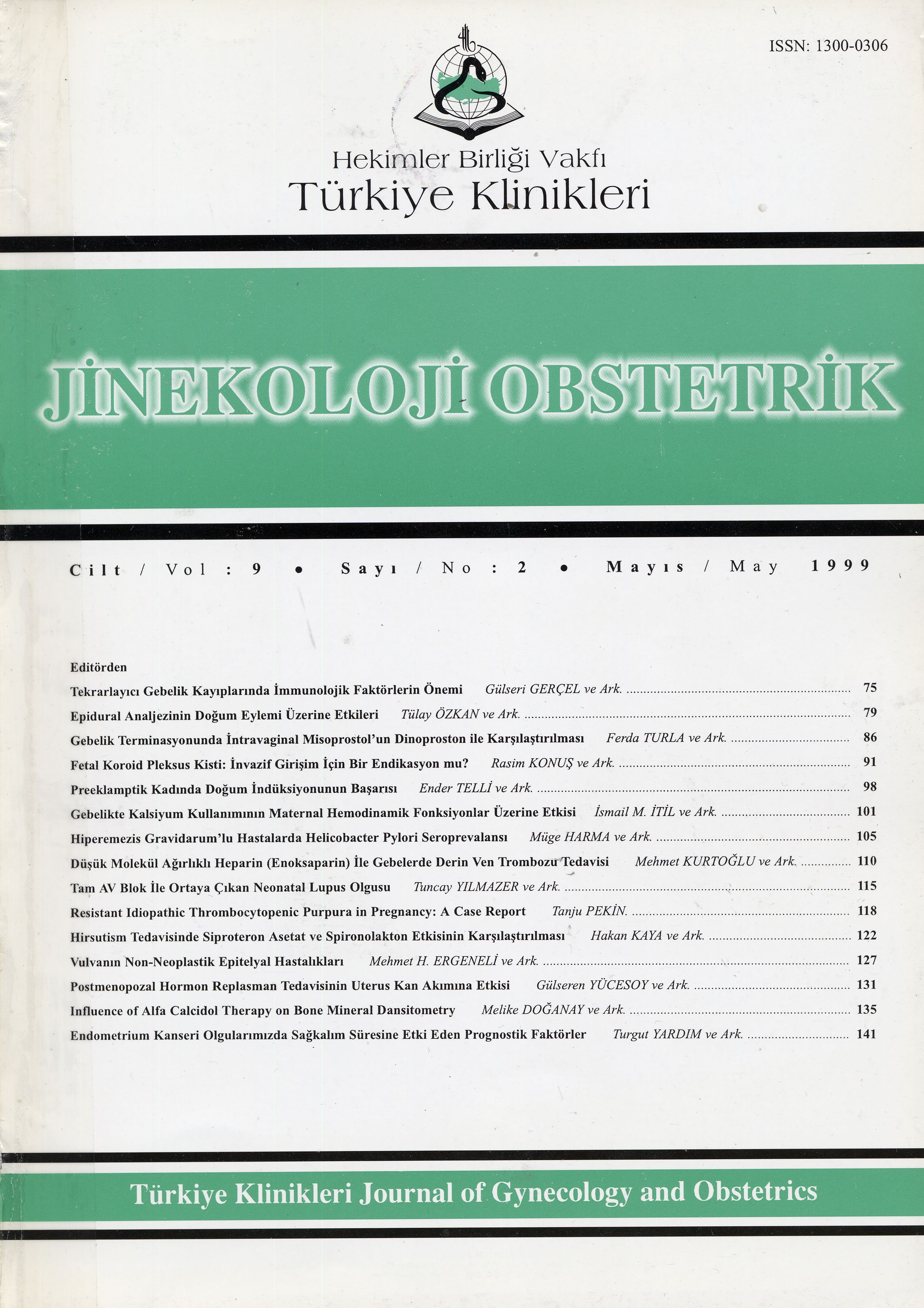Open Access
Peer Reviewed
ARTICLES
4167 Viewed2435 Downloaded
Fetal Choroid Plexus Cyst:is It An Indication For Invasive Procedures?
Fetal Koroid Pleksus Kisti:İnvazif Girişim İçin Bir Endikasyon mu?
Turkiye Klinikleri J Gynecol Obst. 1999;9(2):91-7
Article Language: TR
Copyright Ⓒ 2025 by Türkiye Klinikleri. This is an open access article under the CC BY-NC-ND license (http://creativecommons.org/licenses/by-nc-nd/4.0/)
ÖZET
Amaç: İzole Koroid Pleksus Kisti (KPK) gibi anomalilerin varlığında karyotipleme yapmak henüz tartışmalı bir konudur. İzole KPK olan fetuslarda bazı yazarlar kromozomal çalışma önerirken, diğerleri önermemektedir. Biz, bu çalışmayı izole KPK olan fetuslarda hekimlerin karyotipleme kararına yardımcı olmak amacıyla planladık. Materyel ve Metod: Şubat 1990 - Haziran 1997 tarihleri arasında kliniğimize ikinci düzey ultrasonografik inceleme için başvuran 12080 yüksek-riskli gebe retrospektif olarak tarandı. 168 fetal KPK saptandı. Fetal KPK ile kromozomal anomaliler arasındaki ilişki ve KPKlerinin prognozu araştırıldı. Bulgular: Bir ile dört hafta arayla yapılan ultrason takipleriyle KPK lerinin büyük çoğunluğunun 24. gebelik haftasına kadar kaybolduğunu gördük. 109 KPK olan fetusta karyotipleme yapıldı. Sekiz anormal karyotip (%7.25) saptandı. İzole KPK olan 102 fetusun beş tanesinde (%4.90) anöploidi bulundu. Ancak bu beş vakanın dördünde klinisyeni kromozom analizine yöneltebilecek ek unsurlar vardı. Tartışma ve Sonuç: Çalışmamızın sonuçlarına göre izole koroid pleksus kisti bulunan fetuslarda kromozomal anomali riski, amniyosenteze bağlı fetal kayıp riskinden (1:200) ve 35 yaşındaki bir gebedeki anöploidi ve Down Sendromu riskinden (sırasıyla 1:126 ve 1:260) yüksektir. Bu nedenle izole fetal koroid pleksus kisti varlığında ailelere invazif girişim önerilmelidir.
Amaç: İzole Koroid Pleksus Kisti (KPK) gibi anomalilerin varlığında karyotipleme yapmak henüz tartışmalı bir konudur. İzole KPK olan fetuslarda bazı yazarlar kromozomal çalışma önerirken, diğerleri önermemektedir. Biz, bu çalışmayı izole KPK olan fetuslarda hekimlerin karyotipleme kararına yardımcı olmak amacıyla planladık. Materyel ve Metod: Şubat 1990 - Haziran 1997 tarihleri arasında kliniğimize ikinci düzey ultrasonografik inceleme için başvuran 12080 yüksek-riskli gebe retrospektif olarak tarandı. 168 fetal KPK saptandı. Fetal KPK ile kromozomal anomaliler arasındaki ilişki ve KPKlerinin prognozu araştırıldı. Bulgular: Bir ile dört hafta arayla yapılan ultrason takipleriyle KPK lerinin büyük çoğunluğunun 24. gebelik haftasına kadar kaybolduğunu gördük. 109 KPK olan fetusta karyotipleme yapıldı. Sekiz anormal karyotip (%7.25) saptandı. İzole KPK olan 102 fetusun beş tanesinde (%4.90) anöploidi bulundu. Ancak bu beş vakanın dördünde klinisyeni kromozom analizine yöneltebilecek ek unsurlar vardı. Tartışma ve Sonuç: Çalışmamızın sonuçlarına göre izole koroid pleksus kisti bulunan fetuslarda kromozomal anomali riski, amniyosenteze bağlı fetal kayıp riskinden (1:200) ve 35 yaşındaki bir gebedeki anöploidi ve Down Sendromu riskinden (sırasıyla 1:126 ve 1:260) yüksektir. Bu nedenle izole fetal koroid pleksus kisti varlığında ailelere invazif girişim önerilmelidir.
ANAHTAR KELİMELER: Koroid pleksus kisti, Fetus, Kromozom anomalisi
ABSTRACT
Objective: In the presence of anomalies, such as isolated choroid plexus cysts (CPC), to perform cordocentesis is still controversial. Some of the authors recommend chromosome working for fetuses who have isolated choroid cysts, but the others not. We planned this study to contribute the decision making for the fetuses with isolated choroid plexus cysts. Material and Methods: 12.080 women with high risk pregnancies , whom referred to our clinic, for second level ultrasound examination, between February 1990 and June 1995, are investigated retrospectively. 168 fetal CPC cases found out. The relationship between CPCs and fetal chromosomal abnormalities, and the prognosis of the CPCs is investigated. Findings: By following up with ultrasound three to four weeks intervals, we have seen that the vast majority of CPCs disappeared until 24th gestational weeks. Karyotyping performed to 109 fetuses with CPCs. Eight abnormal karyotypes (7.25%) found. In 102 fetuses with isolated CPCs, 5 fetuses found to be aneuploidy (4.90%). However 4 fetuses in these five cases, there were additional subjects that may direct clinicians to perform karyotype analyzing. Discussion and Result: According to our results, in fetuses with isolated CPCs the risk of chromosomal abnormality is greater than the fetal loss risk of amniocentesis (1:200), and greater than the risk of aneuploidy and Down Syndrome (1:126 and 1:260 respectively) for a woman aged 35 years old. For this reason, at the presence of isolated fetal CPCs, invasive procedure should recommended families.
Objective: In the presence of anomalies, such as isolated choroid plexus cysts (CPC), to perform cordocentesis is still controversial. Some of the authors recommend chromosome working for fetuses who have isolated choroid cysts, but the others not. We planned this study to contribute the decision making for the fetuses with isolated choroid plexus cysts. Material and Methods: 12.080 women with high risk pregnancies , whom referred to our clinic, for second level ultrasound examination, between February 1990 and June 1995, are investigated retrospectively. 168 fetal CPC cases found out. The relationship between CPCs and fetal chromosomal abnormalities, and the prognosis of the CPCs is investigated. Findings: By following up with ultrasound three to four weeks intervals, we have seen that the vast majority of CPCs disappeared until 24th gestational weeks. Karyotyping performed to 109 fetuses with CPCs. Eight abnormal karyotypes (7.25%) found. In 102 fetuses with isolated CPCs, 5 fetuses found to be aneuploidy (4.90%). However 4 fetuses in these five cases, there were additional subjects that may direct clinicians to perform karyotype analyzing. Discussion and Result: According to our results, in fetuses with isolated CPCs the risk of chromosomal abnormality is greater than the fetal loss risk of amniocentesis (1:200), and greater than the risk of aneuploidy and Down Syndrome (1:126 and 1:260 respectively) for a woman aged 35 years old. For this reason, at the presence of isolated fetal CPCs, invasive procedure should recommended families.
MENU
POPULAR ARTICLES
MOST DOWNLOADED ARTICLES





This journal is licensed under a Creative Commons Attribution-NonCommercial-NoDerivatives 4.0 International License.










